The Criminal Courts in England and Wales Karaseni
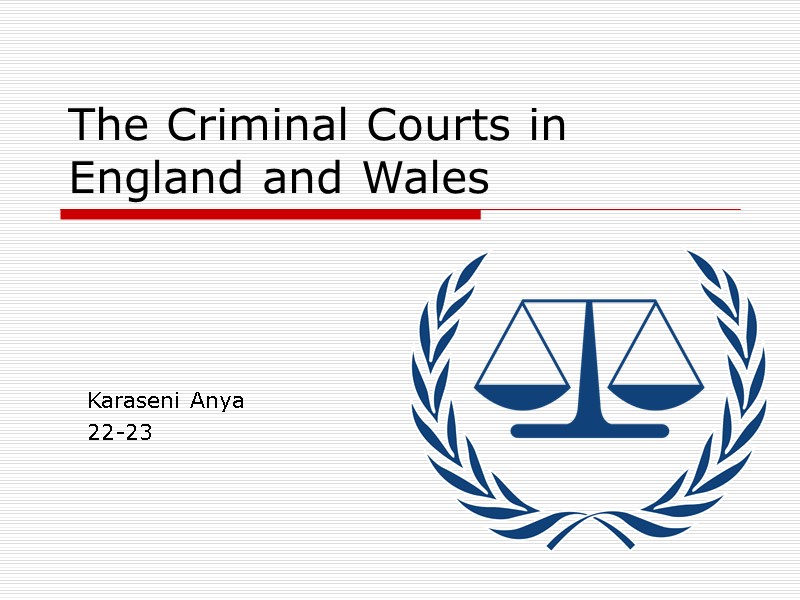
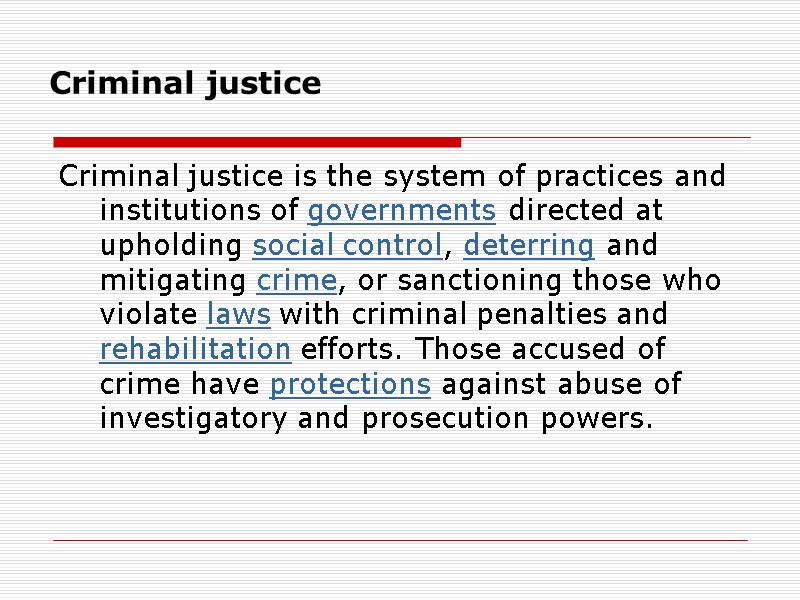
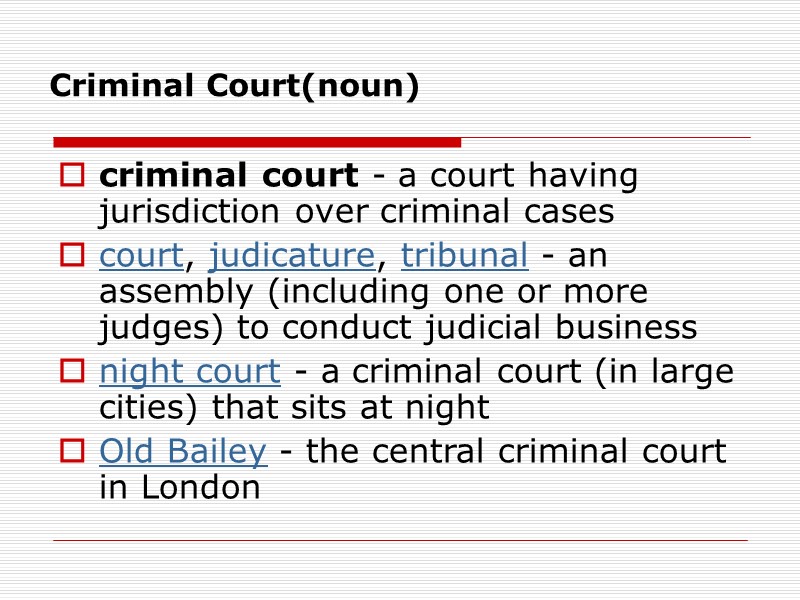
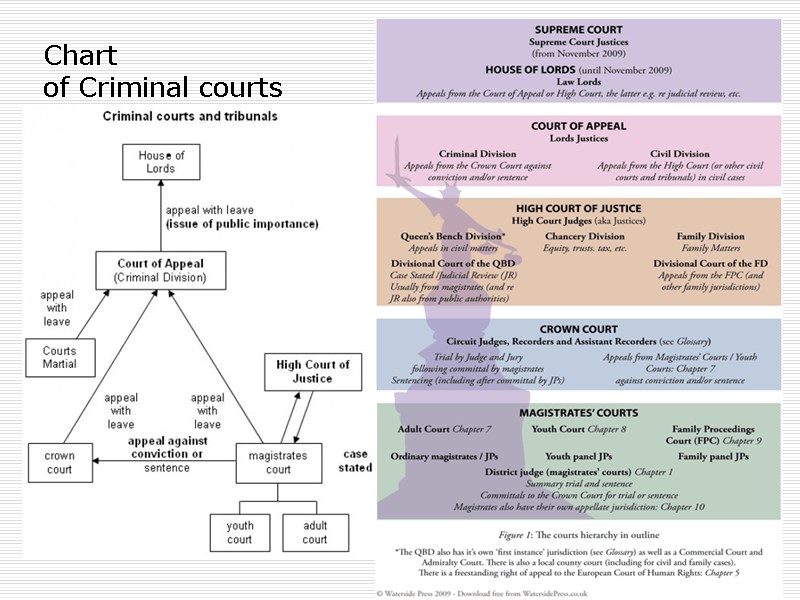
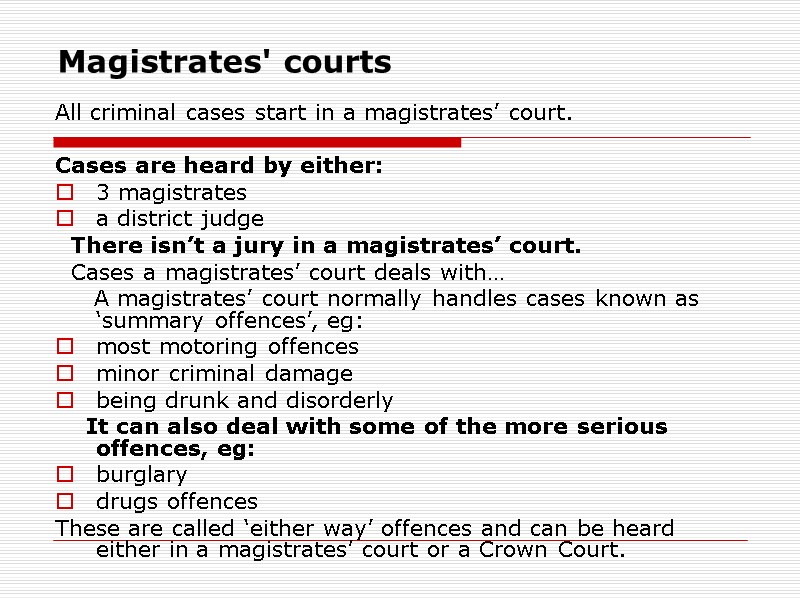
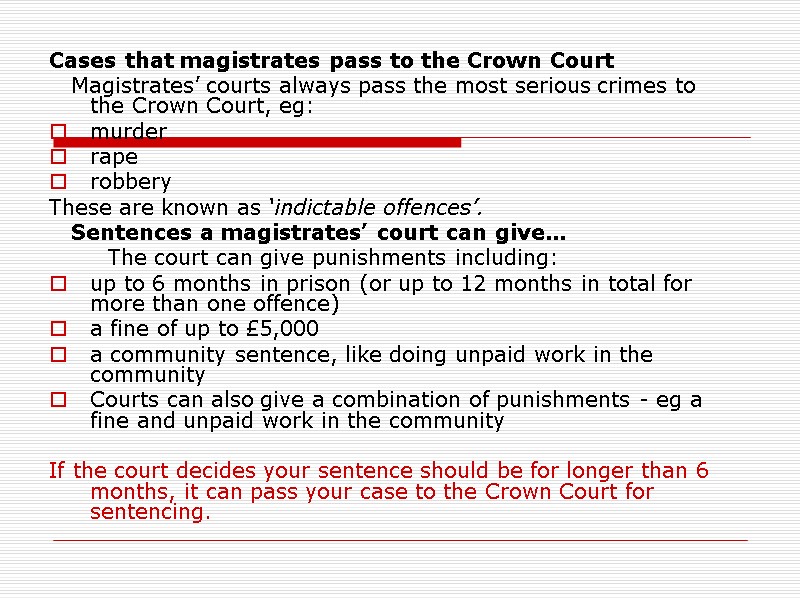
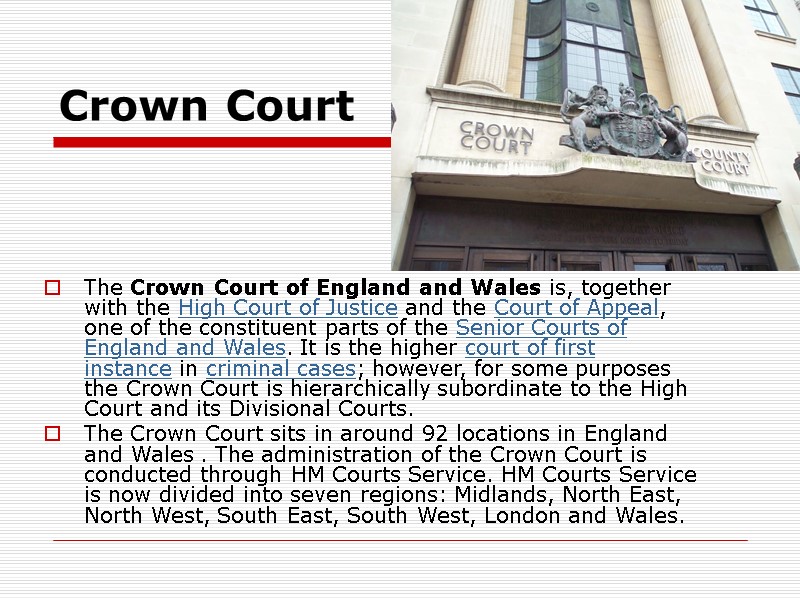
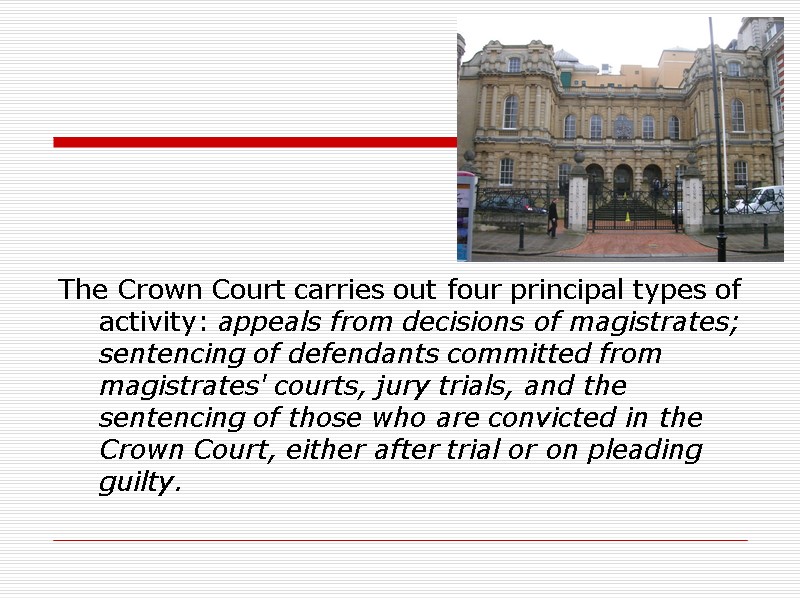
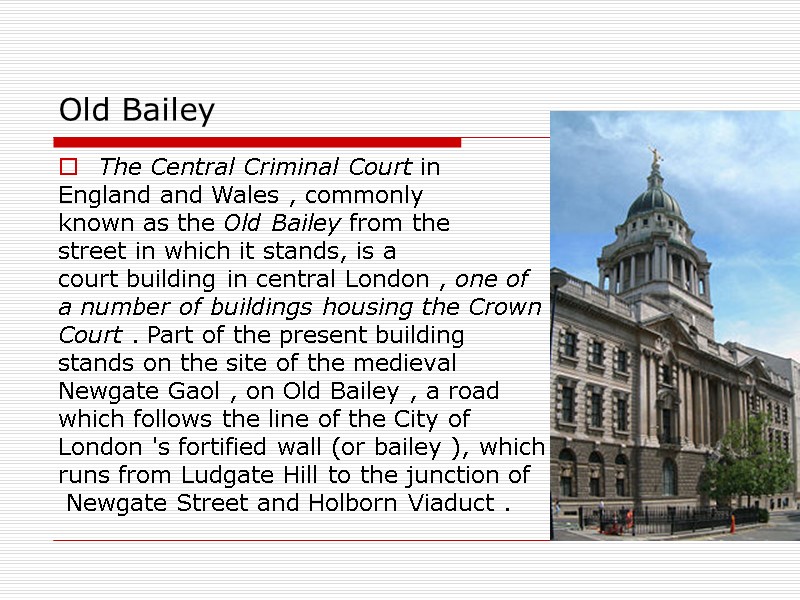
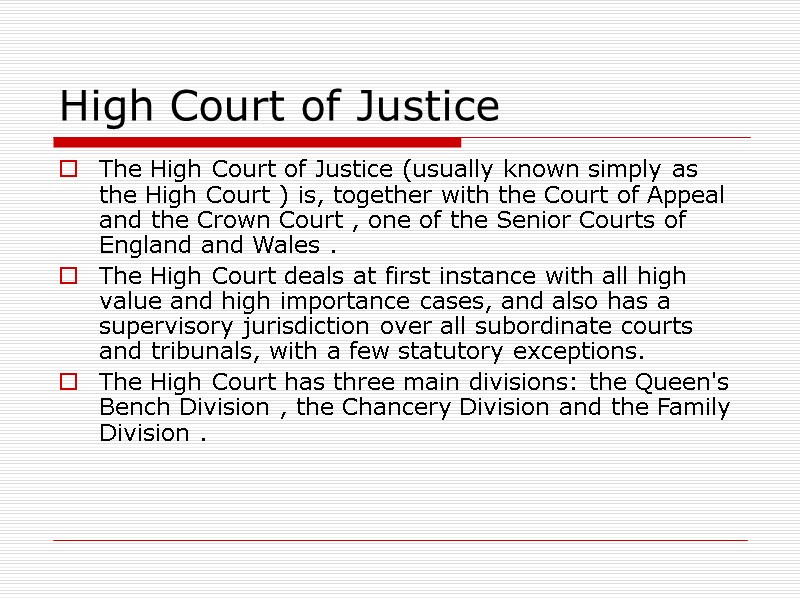
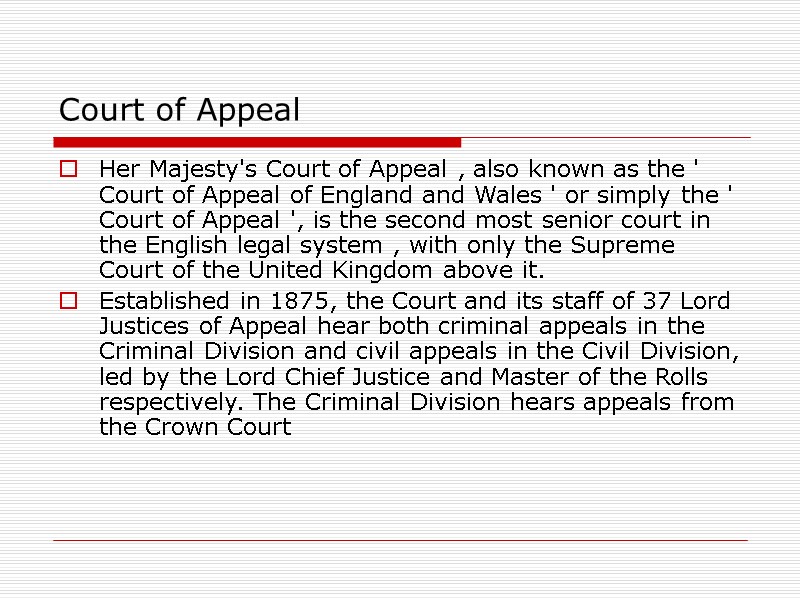
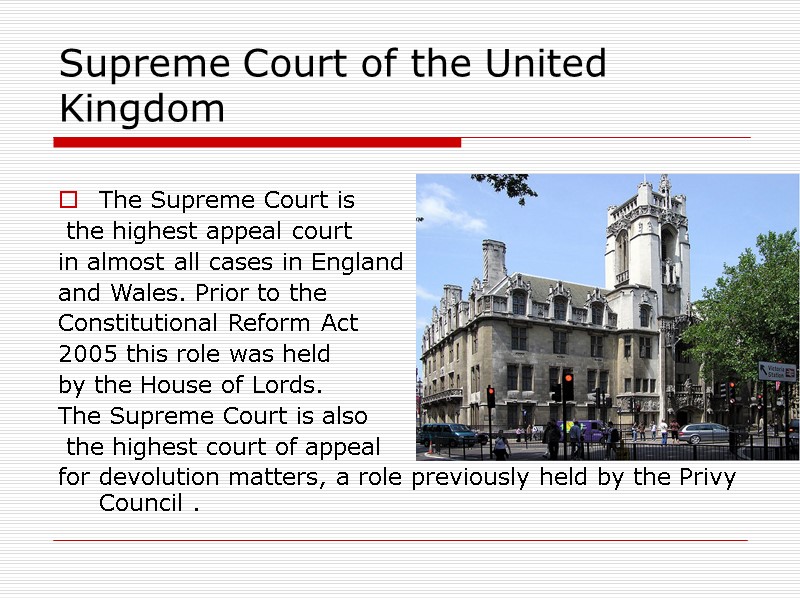
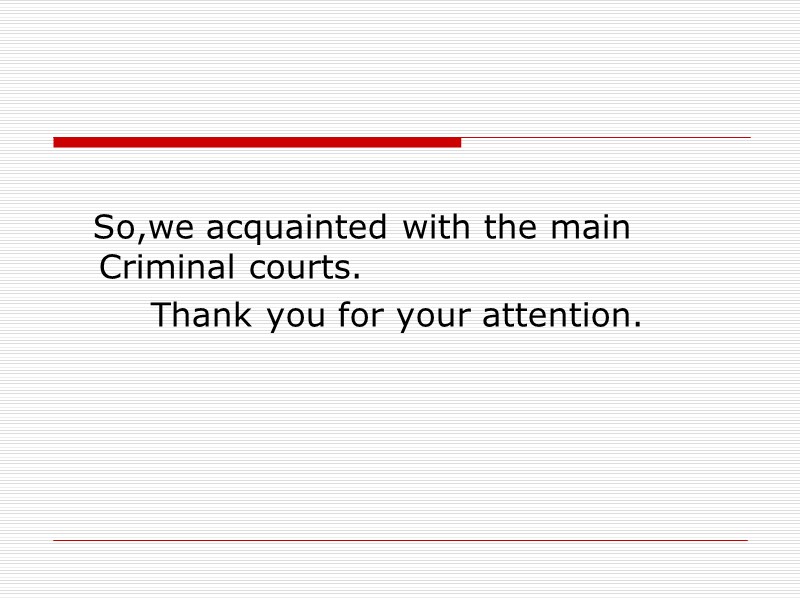
39576-the_criminal_courts.karaseni_a.v.22.ppt
- Количество слайдов: 13
 The Criminal Courts in England and Wales Karaseni Anya 22-23
The Criminal Courts in England and Wales Karaseni Anya 22-23
 Criminal justice Criminal justice is the system of practices and institutions of governments directed at upholding social control, deterring and mitigating crime, or sanctioning those who violate laws with criminal penalties and rehabilitation efforts. Those accused of crime have protections against abuse of investigatory and prosecution powers.
Criminal justice Criminal justice is the system of practices and institutions of governments directed at upholding social control, deterring and mitigating crime, or sanctioning those who violate laws with criminal penalties and rehabilitation efforts. Those accused of crime have protections against abuse of investigatory and prosecution powers.
 Criminal Court(noun) criminal court - a court having jurisdiction over criminal cases court, judicature, tribunal - an assembly (including one or more judges) to conduct judicial business night court - a criminal court (in large cities) that sits at night Old Bailey - the central criminal court in London
Criminal Court(noun) criminal court - a court having jurisdiction over criminal cases court, judicature, tribunal - an assembly (including one or more judges) to conduct judicial business night court - a criminal court (in large cities) that sits at night Old Bailey - the central criminal court in London
 Chart of Criminal courts
Chart of Criminal courts
 Magistrates' courts All criminal cases start in a magistrates’ court. Cases are heard by either: 3 magistrates a district judge There isn’t a jury in a magistrates’ court. Cases a magistrates’ court deals with… A magistrates’ court normally handles cases known as ‘summary offences’, eg: most motoring offences minor criminal damage being drunk and disorderly It can also deal with some of the more serious offences, eg: burglary drugs offences These are called ‘either way’ offences and can be heard either in a magistrates’ court or a Crown Court.
Magistrates' courts All criminal cases start in a magistrates’ court. Cases are heard by either: 3 magistrates a district judge There isn’t a jury in a magistrates’ court. Cases a magistrates’ court deals with… A magistrates’ court normally handles cases known as ‘summary offences’, eg: most motoring offences minor criminal damage being drunk and disorderly It can also deal with some of the more serious offences, eg: burglary drugs offences These are called ‘either way’ offences and can be heard either in a magistrates’ court or a Crown Court.
 Cases that magistrates pass to the Crown Court Magistrates’ courts always pass the most serious crimes to the Crown Court, eg: murder rape robbery These are known as ‘indictable offences’. Sentences a magistrates’ court can give… The court can give punishments including: up to 6 months in prison (or up to 12 months in total for more than one offence) a fine of up to £5,000 a community sentence, like doing unpaid work in the community Courts can also give a combination of punishments - eg a fine and unpaid work in the community If the court decides your sentence should be for longer than 6 months, it can pass your case to the Crown Court for sentencing.
Cases that magistrates pass to the Crown Court Magistrates’ courts always pass the most serious crimes to the Crown Court, eg: murder rape robbery These are known as ‘indictable offences’. Sentences a magistrates’ court can give… The court can give punishments including: up to 6 months in prison (or up to 12 months in total for more than one offence) a fine of up to £5,000 a community sentence, like doing unpaid work in the community Courts can also give a combination of punishments - eg a fine and unpaid work in the community If the court decides your sentence should be for longer than 6 months, it can pass your case to the Crown Court for sentencing.
 Crown Court The Crown Court of England and Wales is, together with the High Court of Justice and the Court of Appeal, one of the constituent parts of the Senior Courts of England and Wales. It is the higher court of first instance in criminal cases; however, for some purposes the Crown Court is hierarchically subordinate to the High Court and its Divisional Courts. The Crown Court sits in around 92 locations in England and Wales . The administration of the Crown Court is conducted through HM Courts Service. HM Courts Service is now divided into seven regions: Midlands, North East, North West, South East, South West, London and Wales.
Crown Court The Crown Court of England and Wales is, together with the High Court of Justice and the Court of Appeal, one of the constituent parts of the Senior Courts of England and Wales. It is the higher court of first instance in criminal cases; however, for some purposes the Crown Court is hierarchically subordinate to the High Court and its Divisional Courts. The Crown Court sits in around 92 locations in England and Wales . The administration of the Crown Court is conducted through HM Courts Service. HM Courts Service is now divided into seven regions: Midlands, North East, North West, South East, South West, London and Wales.
 The Crown Court carries out four principal types of activity: appeals from decisions of magistrates; sentencing of defendants committed from magistrates' courts, jury trials, and the sentencing of those who are convicted in the Crown Court, either after trial or on pleading guilty.
The Crown Court carries out four principal types of activity: appeals from decisions of magistrates; sentencing of defendants committed from magistrates' courts, jury trials, and the sentencing of those who are convicted in the Crown Court, either after trial or on pleading guilty.
 Old Bailey The Central Criminal Court in England and Wales , commonly known as the Old Bailey from the street in which it stands, is a court building in central London , one of a number of buildings housing the Crown Court . Part of the present building stands on the site of the medieval Newgate Gaol , on Old Bailey , a road which follows the line of the City of London 's fortified wall (or bailey ), which runs from Ludgate Hill to the junction of Newgate Street and Holborn Viaduct .
Old Bailey The Central Criminal Court in England and Wales , commonly known as the Old Bailey from the street in which it stands, is a court building in central London , one of a number of buildings housing the Crown Court . Part of the present building stands on the site of the medieval Newgate Gaol , on Old Bailey , a road which follows the line of the City of London 's fortified wall (or bailey ), which runs from Ludgate Hill to the junction of Newgate Street and Holborn Viaduct .
 High Court of Justice The High Court of Justice (usually known simply as the High Court ) is, together with the Court of Appeal and the Crown Court , one of the Senior Courts of England and Wales . The High Court deals at first instance with all high value and high importance cases, and also has a supervisory jurisdiction over all subordinate courts and tribunals, with a few statutory exceptions. The High Court has three main divisions: the Queen's Bench Division , the Chancery Division and the Family Division .
High Court of Justice The High Court of Justice (usually known simply as the High Court ) is, together with the Court of Appeal and the Crown Court , one of the Senior Courts of England and Wales . The High Court deals at first instance with all high value and high importance cases, and also has a supervisory jurisdiction over all subordinate courts and tribunals, with a few statutory exceptions. The High Court has three main divisions: the Queen's Bench Division , the Chancery Division and the Family Division .
 Court of Appeal Her Majesty's Court of Appeal , also known as the ' Court of Appeal of England and Wales ' or simply the ' Court of Appeal ', is the second most senior court in the English legal system , with only the Supreme Court of the United Kingdom above it. Established in 1875, the Court and its staff of 37 Lord Justices of Appeal hear both criminal appeals in the Criminal Division and civil appeals in the Civil Division, led by the Lord Chief Justice and Master of the Rolls respectively. The Criminal Division hears appeals from the Crown Court
Court of Appeal Her Majesty's Court of Appeal , also known as the ' Court of Appeal of England and Wales ' or simply the ' Court of Appeal ', is the second most senior court in the English legal system , with only the Supreme Court of the United Kingdom above it. Established in 1875, the Court and its staff of 37 Lord Justices of Appeal hear both criminal appeals in the Criminal Division and civil appeals in the Civil Division, led by the Lord Chief Justice and Master of the Rolls respectively. The Criminal Division hears appeals from the Crown Court
 Supreme Court of the United Kingdom The Supreme Court is the highest appeal court in almost all cases in England and Wales. Prior to the Constitutional Reform Act 2005 this role was held by the House of Lords. The Supreme Court is also the highest court of appeal for devolution matters, a role previously held by the Privy Council .
Supreme Court of the United Kingdom The Supreme Court is the highest appeal court in almost all cases in England and Wales. Prior to the Constitutional Reform Act 2005 this role was held by the House of Lords. The Supreme Court is also the highest court of appeal for devolution matters, a role previously held by the Privy Council .
 So,we acquainted with the main Criminal courts. Thank you for your attention.
So,we acquainted with the main Criminal courts. Thank you for your attention.
